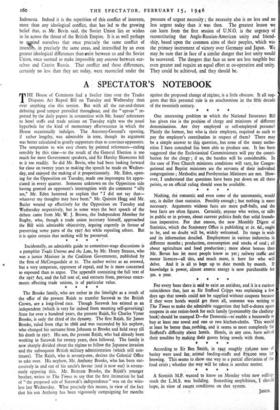A SPECTATOR'S NOTEBOOK
THE House of Commons had a livelier time over the Trades Disputes Act Repeal Bill on Tuesday and Wednesday than over anything else this session. But with all the cut-and-thrust debating good temper prevailed throughout, and the " uproar " re- ported by the daily papers in connection with Mr. Isaacs' references
• to hotel staffs and trade unions on Tuesday night was the usual hyperbole for the kind of momentary effervescence in which the House occasionally indulges. The Attorney-General's opening, if rather lengthy, was admirable in tone, though its argument was better calculated to gratify supporters than to convince opponents. The temptation to win easy cheers by pointed references—staling sensibly by this time—to the result of the General Election is too much for most Government speakers, and Sir Hartley Shawcross fell to it too readily. So did Mr. Bevin, who had been looking forward for close on twenty years to making the speech he made on Wednes- day, and enjoyed the making of it proportionately. Mr. Eden, open- ing for the Opposition on Tuesday, made one impromptu hit appre- ciated in every quarter. Someone unknown on the Opposition side having greeted an opponent's interruption with the comment "silly ass," Mr. Eden hastened to explain that "I did not say that— whatever my thoughts may have been." Mr. Quintin Hogg and Mr. Butler wound up effectively for the Opposition on Tuesday and Wednesday respectively, but in some ways the best speech of the debate came from Mr. W. J. Brown, the Independent Member for Rugby, who, though a trade union secretary himself, approached the Bill with admirable objectivity, arguing cogently in favour of preserving some parts of the 1927 Act while repealing others. But it is quite certain that nothing will be preserved.


























 Previous page
Previous page